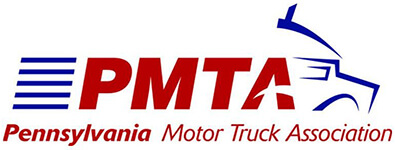Announcement of Liability Reform Package in Pennsylvania House of Representatives
These bills are an important step toward stopping lawsuit abuse against trucking companies
The Pennsylvania Motor Truck Association (PMTA) applauded today’s announcement of a liability reform package announced by Representative Torren Ecker and other members of the Pennsylvania House of Representatives. With today’s announcement, Pennsylvania joins the list of states where similar common-sense reform bills have been introduced to address abusive litigation practices that target the trucking industry.
“Trucking companies are often the target of unfair and abusive litigation practices that threaten truckers’ livelihoods, put small businesses at risk, and threaten our supply chain,” said Rebecca Oyler, PMTA’s President & CEO. “We commend the sponsors of these bills for recognizing the harm that lawsuit abuse does to Pennsylvania’s economy and to residents who pay higher costs for the goods they buy every day. Now’s the time to ensure that balance and fairness drive litigation outcomes, not profits.”
Pennsylvania’s economy depends on the trucking industry to transport goods from farm to factory, warehouse to store, and producer to consumer. There are almost 70,000 trucking companies located in the Commonwealth. These companies, which are primarily small, locally owned businesses, hire 341,000 workers in Pennsylvania, or one in every 15 employees.
These companies operate against the backdrop of one of the worst judicial hellholes in the nation, according to the American Tort Reform Foundation. Pennsylvania’s reputation as a center for lawsuit abuse and excessive jury awards makes the state unfriendly for business, resulting in lost economic activity and increased costs for businesses. In the trucking sector, a single lawsuit could mean bankruptcy for a small trucking company. And abusive legal practices increase costs across the supply chain for producers and consumers.
The legislative package includes:
Introduction of seatbelt evidence – Even though seatbelts are legally required for front seat occupants and children in Pennsylvania, the Commonwealth’s law is inconsistent in that it prohibits motor carriers from defending themselves in court with evidence that a plaintiff was not wearing a seat belt at the time of the accident. A plaintiff’s own negligence in choosing not to wear a safety belt should be and is probative evidence to present the full facts of a particular incident – including how injuries occurred. This legislation makes Pennsylvania’s law consistent by allowing for the introduction into evidence of a lack of seat belt use in an automobile personal injury lawsuit.
Regulating third-party litigation funding to protect consumers – Also known as “lawsuit lending,” third-party litigation funding occurs when disinterested, third-party lenders– often out-of-state investment firms with billion-dollar portfolios – front the cost of lawsuits with an agreement that the plaintiff will repay the lender with interest on the verdict or settlement. This form of “jackpot justice” takes advantage of a plaintiff’s suffering as an investment vehicle they hope will bring windfall profits. It also incentivizes plaintiffs to pursue outsized verdicts in order to repay their loan, making it harder to reach reasonable settlements. Third-party funder information is not required to be provided to the defense. This bill requires third-party litigation funders to register with the Department of Insurance in order to do business in Pennsylvania and provide disclosure to all parties in order to protect injured plaintiffs from unfair business practices.
Amend the personal jurisdiction consent statute for out-of-state corporations – Under state law, an out-of-state corporation is subject to personal jurisdiction in Pennsylvania for cause of action that arises completely in another state, simply by registering to do business in the Commonwealth. Pennsylvania is the only state in the nation that has this onerous requirement as a condition of doing business. This legislation amends the statute to omit consent to jurisdiction or, in the alternative, to limit jurisdiction to those causes of action arising within Pennsylvania as a result of the actions of the business within the Commonwealth.
Cap Contingency Fees - Limiting exorbitant profiteering by plaintiff’s attorneys will maximize recoveries for truly injured plaintiffs while discouraging frivolous lawsuit filings by less scrupulous attorneys. This proposal would implement a sliding scale of continency fees: 33.3% of the first $100,000 in verdict; 25% of the subsequent $500,000; 15% of the remainder of verdict awards (i.e., above $600,000).
Fair Share Repair Act (HB 2390) – Over the years, activist judges have chipped away at the tenants of the Fair Share Act, limiting its scope and expanding liability in the Commonwealth. This bill will restore the Fair Share Act to its original, equitable, and carefully balanced original meaning, ensuring that trucking companies are not unfairly and disproportionately targeted.
Constitutional Amendment to remove exclusive jurisdiction of the Pennsylvania Supreme Court over the practice of law and related areas (HB 1124) – The Pennsylvania Supreme Court has exercised its vast control over litigation through its assertion of exclusive constitutional authority of all judicial proceedings. This has effectively blocked the policymaking branches of government from establishing policy in many important areas such as venue. This proposed Constitutional Amendment would remove from Article V the exclusive authority of the Supreme Court over power to prescribe general rules governing practices, procedure, and the conduct of all courts and the practice of law. While the Supreme Court would retain their powers in the absence of legislation, the General Assembly would gain power to pass laws governing any of these subjects.
Other bills in the package address the following issues:
- Restoring fairness to medical malpractice by restoring venue to the county where the alleged injury occurred
- Strengthening statutory confidentiality protections for peer review to provide healthcare providers and facilities with clear guidance regarding confidentiality
- Limiting website accessibility litigation by requiring a 60-day safe harbor for website owners to cure an accessibility issue before a lawsuit can be filed
“We look forward to discussing with the General Assembly the many benefits to the trucking industry and to the Commonwealth of restoring fairness, balance, and transparency to our judicial system,” said Oyler. “This package of bills gives us the opportunity to do just that.”
